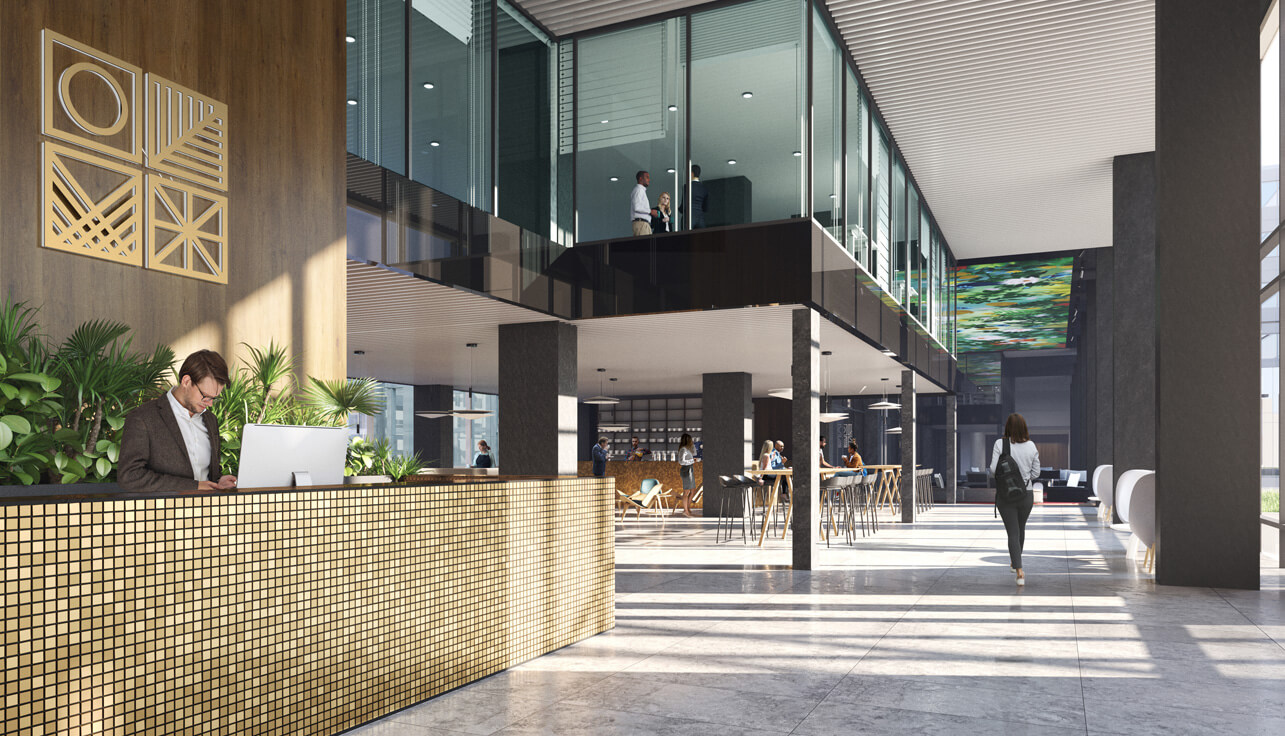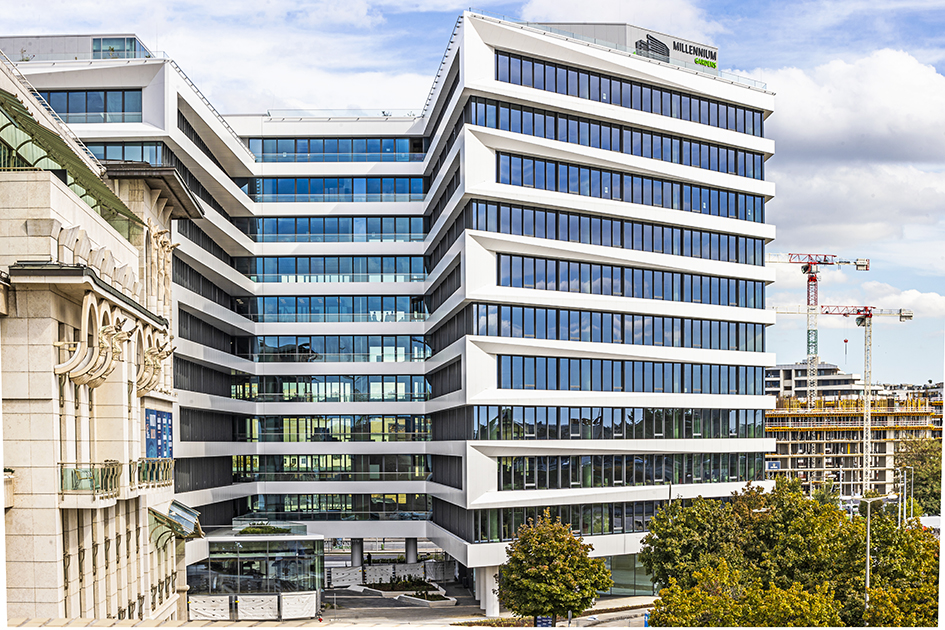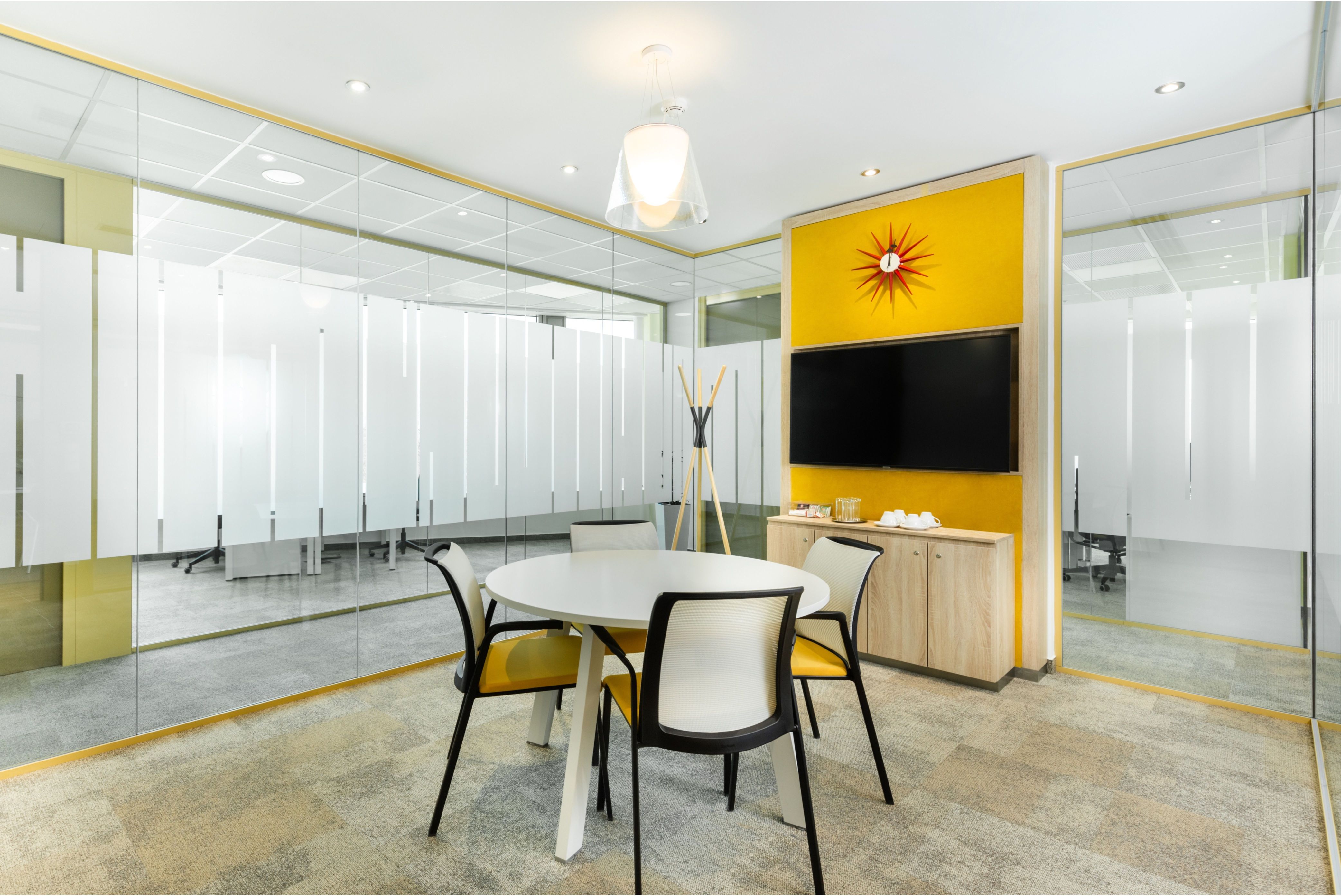2023 a Restrained 12 Months for Deals
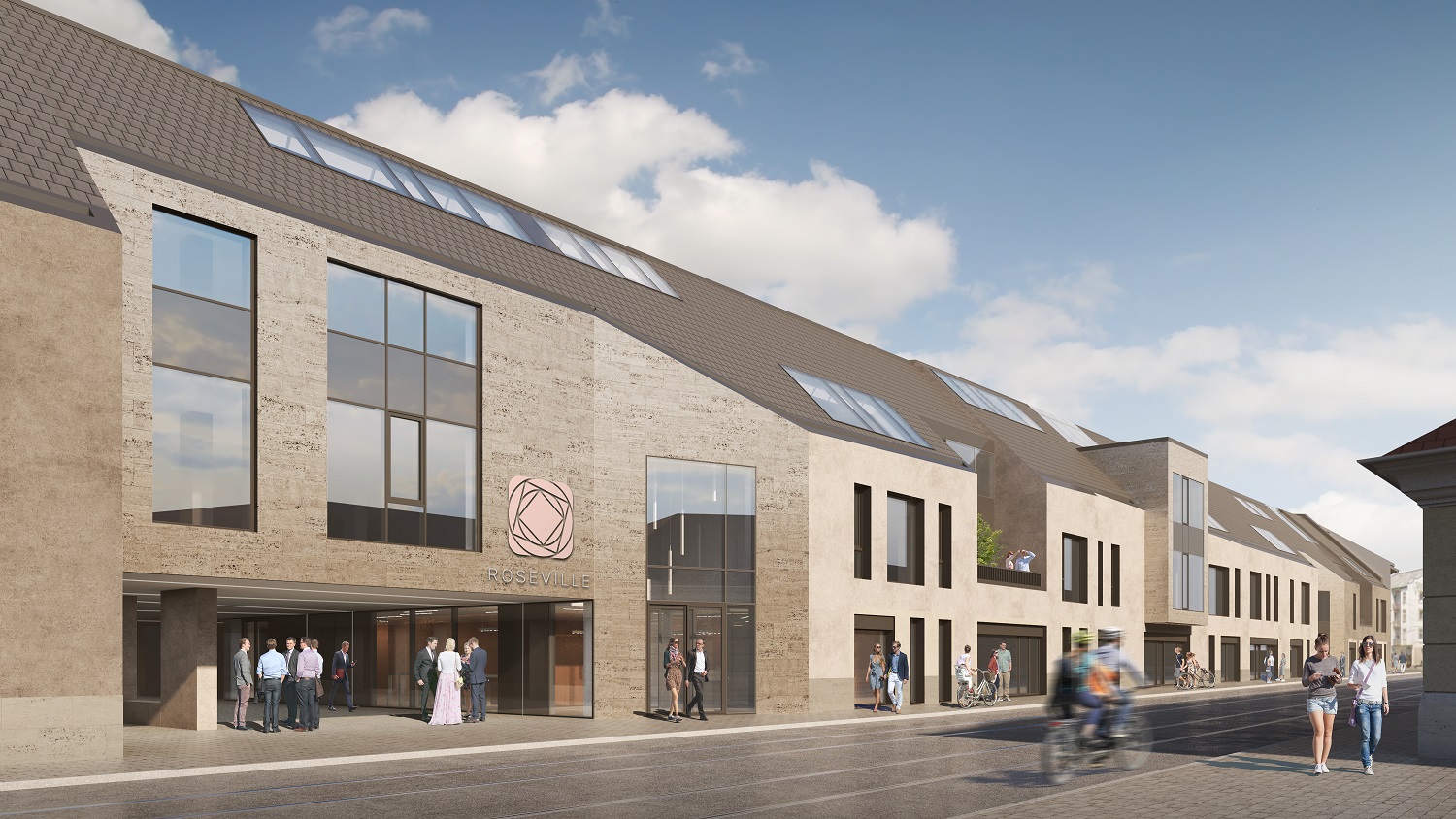
Atenor sold its 15,500 sqm RoseVille office complex in District III to an international investment group with a Hungarian fund, attracting new equity to the market.
This has been a restrained year for development activity in the office and retail fields. That in the industrial and hotel sectors, however, has been more dynamic. Investment activity has reflected the cautious wait-and-see strategy being adopted by investors towards the Hungarian property markets and, indeed, CEE and Europe as a whole.
Domestic investors have an advantage over foreign investors, given the former’s knowledge of local conditions and close contact with market actors. Consultancies estimate that 70% of transactions this year have been concluded by Hungarian investors. IO Partners have traced EUR 335 million in investment activity for the first three quarters of 2023, with Hungary third in Central Europe behind Poland and the Czech Republic, as is the established pattern.
This investor reticence reflects the unstable geopolitical environment, the resulting economic and financial uncertainty, and the expectation gap between buyers and sellers with an anticipated yield correction. Budapest Business Journal real estate editor Gary J. Morrell picks out some of the highlights of the year.
Office Sector
In my view, the deal of the year in the office sector is September’s acquisition of the first phase of the H2Offices development by the Erste Real Estate Fund. Even if the office asset class remains less prominent than before, transactions are possible for assets that tick all the right boxes, says Benjamin Perez Ellischewitz, principal at Avison Young Hungary.
This transaction involved the purchase of the initial 27,000 sqm phase of the project in the ever-popular Váci Corridor from Skanska. The complex is already Leed “Platinum” accredited, and the developer is also aiming for Well accreditation. The eventual plan envisages three office buildings that will provide about 67,000 sqm of office space.
“We are delighted that our long-term trusted relationship with Erste Real Estate Fund [has] resulted in the successful transaction of the H2Offices project. This transaction stands as a testimony to the interest in high-quality and sustainable real estate products, indicating a positive shift in demand on the investment market,” says Katarzyna Zawodna-Bijoch, president and CEO of the Skanska commercial development business unit in CEE.
This is the third transaction between Skanska and the Hungarian investors in Budapest after the Nordic Light and Mill Park deals in 2016 and 2018, respectively.
“In offices, the move of Wizz Air to Millennium Tower I for roughly 8,000 sqm and the consolidation and rationalization of the Deutsche Telekom Group in the Telekom HQ building, with IT Solutions taking 11,000 sqm, are the most significant deals,” adds Benjamin Perez-Ellischewitz.
Atenor has sold the recently completed the 15,500 sqm RoseVille office complex in District III, certified “Excellent” by Breeam. The deal follows a traditional pattern for the regional developer: speculative development with a strong prelease, letting a significant part of a project, and finally, a sale to an investor.
“We have sold RoseVille to an international investment group with a Hungarian fund. The sale was quick and aligned with current market conditions. This was the first real estate acquisition by the group in Hungary, and we see it as positive that we have attracted new equity, although, in the current investment environment, only opportunistic investors are looking at Hungary,” says Máté Galambos, director of leasing at Atenor Hungary.
Although no yields have been announced on the above-mentioned transactions, Colliers estimates Budapest office yields at 6.25%, with industrial at 6.5% and shopping centers at 7.5%. Prime Budapest office yields have shifted by 75-100 basis points to 6.5%, according to iO Partners Budapest.
Away from the disposal side of the business, Skanska is also doing well in terms of finding tenants, and has achieved the milestone of 80% leased space at H2Offices.
“The demand for this building has been consistently high since the start of its development, with a steady stream of inquiries for the remaining available spaces, as well as strong interest for H2Offices as a complex,” the developer says. “For our tenants, the mix between the quality of our class ‘A’ building in a top location and the ESG principles was crucial in choosing the new space for their employees,” it insists.
“There is an increasing trend among tenants for seeking buildings that have ESG criteria at the base of their concept and development. Energy-efficient buildings not only contribute to reducing the carbon footprint but also result in lower operational costs, which is an attractive proposition for businesses. Additionally, more companies have their own ESG objectives, and such a carefully developed building […] can support them in achieving their real estate objectives,” Skanska adds.
The first phase of Skanska’s H2Offices development was acquired by the Erste Real Estate Fund.
According to the developer, the project has set a new benchmark on the Hungarian market by achieving Leed “Platinum” certification with 84 points, the highest score yet achieved in Hungary. The company is also in the process of obtaining Well Health & Safety recognition. The sustainable solutions have resulted in a 40% reduction in water usage, a decrease of 290 tonnes of annual carbon dioxide emissions, and energy consumption reductions of 30%. This data is based on Leed calculations and comparisons.
In terms of new projects, office developers are exercising caution and not initiating them in an uncertain development environment. However, despite concerns over longer-term letting and demand, working practices and the time spent in the office, alongside rising development, construction, maintenance and energy costs and more expensive debt finance, already launched projects, both single-building and phased, are going ahead.
The current financial environment and high interest rates favor developers able to use their own funds or sell assets to investors. IO Partners has traced 4.34 million sqm of office stock in Budapest with a current vacancy rate of around 13%. A further 287,000 sqm of space is under construction and expected to be completed between now and 2026.
An alternative development option to building from new is the redevelopment and renovation of existing quality buildings, notably in the Central Business District, where there is a scarcity of building plots but a number of listed properties in need of renovation. [Editor’s note: A similar approach is also sometimes taken in the hotel sector. Read the Hotel and Hospitality section below for more on this.]
A prime recent office example of this was Europa Capital’s purchase of the 12,500 sqm Academia office building on the Pest embankment in partnership with ConvergenCE as asset manager. The pair have undertaken an extensive renovation in line with Breeam requirements. The development has already been awarded Well pre-certification status, and full accreditation is expected for the summer, according to ConvergenCE.
“ESG requirements are mainly tenant-led, and we designed the Academia project based on ESG principles, using the Hungarian BuildEXT architects. This [property] is located in the CBD, where there are few developments for new build projects. We do not undertake development of new buildings from the ground but focus on value-added developments of existing buildings that require refurbishment,” comments Csaba Zeley, managing director of ConvergenCE. Academia had its grand reopening on Sep. 29.

The 45,000 sqm MG3 warehouse of HelloParks Maglód was the first industrial property in Hungary to earn the highest “Outstanding” rating in the New Construction category of the Breeam sustainability standard.
Industrial and Logistics
The industrial sector continues to attract specialist developers and industrial park operators in addition to established players from other fields, such as office or residential, moving into what is considered an attractive property market. Total industrial stock in Hungary has reached 5 million sqm, out of which 3.4 million sqm is located in the Greater Budapest area, according to Cushman & Wakefield.
Benjamin Perez-Ellischewitz of Avison Young Hungary sees the 24,000 sqm prelease by Transdanubia at HelloParks Páty as a landmark achievement for the industrial and logistics sector. Panattoni, meanwhile, has agreed its third built-to-suit project in Hungary with a 32,000 sqm development for a national retail chain.
Despite the development boom in this sector, investment activity is limited by industrial park operators tending to hold on to their stock for the longer term, especially given the favorable market conditions. One transaction that does stand out is the sale by Panattoni of two regional development projects to Hungarian buyers.
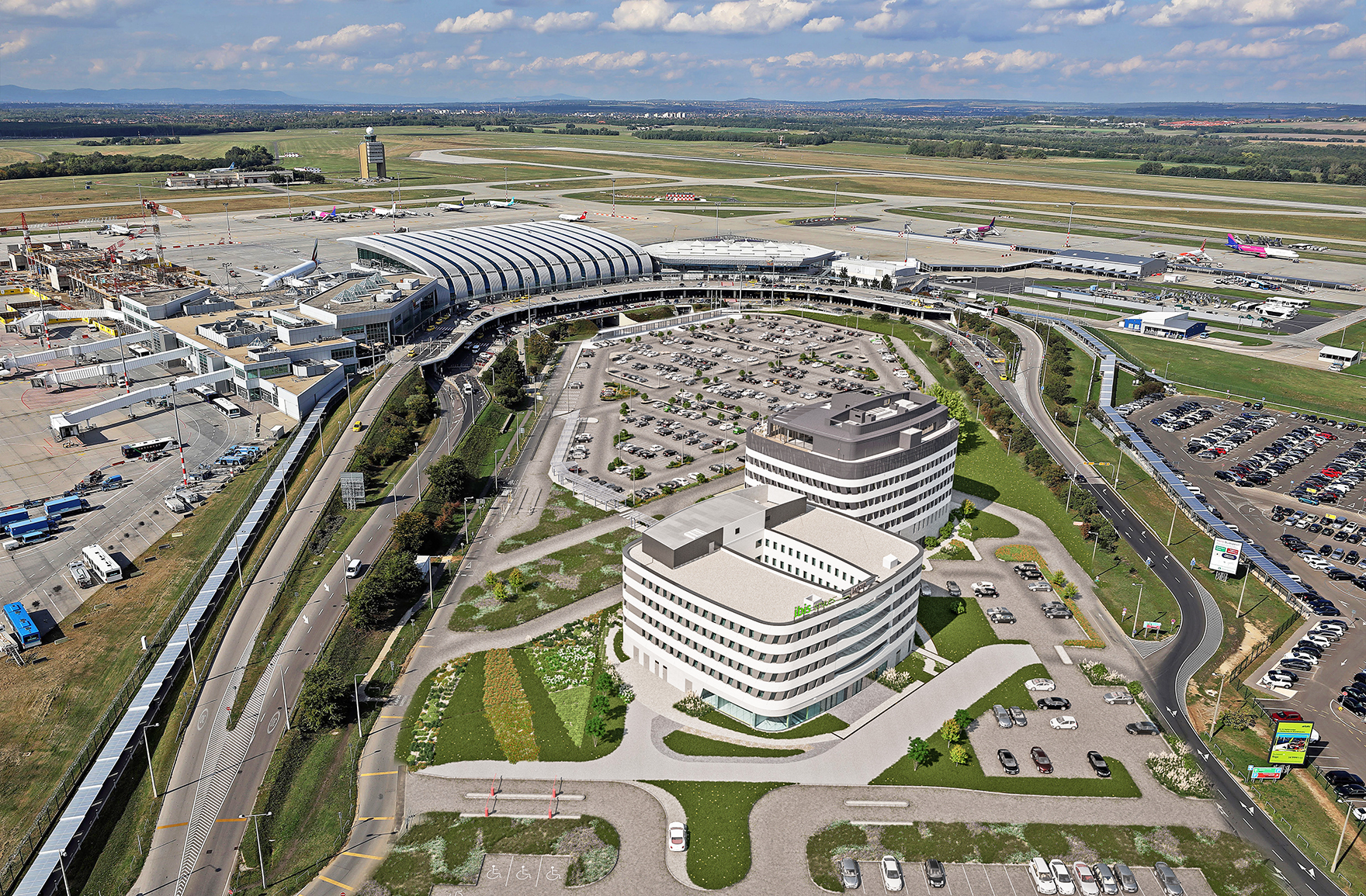
Wing will develop a 167-room, four-star Tribe hotel (with the dark roof in this artist’s rendering) adjacent to the Ibis Styles Budapest Airport Hotel, which the same developer completed in 2018.
Hotel and Hospitality
Despite the perceived complexities of hotel development and investment projects, hospitality has successfully attracted investors and developers from the more traditional commercial property sectors.
A commonly used route is to conclude a long-term lease or franchise partnership with experienced branded operators who provide the hotel and hospitality-related expertise, in theory leaving the investors to concentrate on their portfolios.
A prime example of this is W Hotels, part of the Marriott brand, which opened the 150-room and suite luxury W Hotel Budapest in July, following the renovation of the 16,000 sqm UNESCO-listed Drechsler Palace on Andrássy út. The project, by QPR Properties of Qatar, has been ongoing for years and was subject to several delays.
This reflects the potential difficulties of developing in the historic center with the strict and often complex planning regulations that require separate permissions from city and heritage authorities. A notable trend in the Budapest market has been the purchase and redevelopment of classical Central European buildings into hotels, giving the properties a use-value while at the same time maintaining the Dual Monarchy feel of the historic center of the city.
Wing has launched several new hotel projects. This year, it has agreed to develop a 167-room, four-star Tribe hotel adjacent to the Ibis Styles Budapest Airport Hotel that the same developer opened in 2018. This will be the second Tribe Hotel in Budapest after the one in the mixed-used Liberty complex that Wing delivered earlier in 2023. This includes class “A” office and commercial units in addition to the hotel, which is dual branded, consisting of the three-star Ibis Budapest Stadium and the four-star Tribe Budapest Stadium. Wing has also brought two new hotel brands to Budapest with developments for IHG Hotels and Resorts and Holiday Inn Express.
Retail
There are no plans for another Budapest shopping center for the foreseeable future, but that does not mean there is no activity in the sector. The Hungarian Adventum Investment Fund Management Zrt. has purchased a portfolio of Tesco retail parks in Hungary and the Czech Republic and is redeveloping 15 of these across Hungary.
“We are responsible for 15 projects and locations around Hungary. The total size of the portfolio is 320,000 sqm GLA. This is a good opportunity to create added-value retail space, renew leases and introduce new tenants to create a better quality of retail galleries in this portfolio,” comments Erika Garbutt-Pál, head of retail at CBRE Hungary.
ESG Considerations
In addition to the ongoing price correction that is causing yields to move out, the investment market is impacted by ESG and sustainability issues, especially at the higher end. According to Colliers, ESG-compliant buildings are slowly becoming the market norm, reflecting a broader commitment to sustainability from developers, owners, investors, lenders and occupiers.
The above-mentioned RoseVille is an excellent example of this, according to Zsombor Barta, ambassador (and former president) of the Hungarian Green Building Council. “Sustainability aspects played an important role during this investment; therefore, I am expecting more of these deals, where sustainability is considered one of the main elements and aspects from an investment point of view,” he says.
Kevin Turpin, the regional director of capital markets in Central and Eastern Europe for Colliers, expects the ESG-related pressure on developers will only grow. “Given the current market environment, timing in terms of related costs may well mean further implications to pricing that have not yet been factored in. However, increasing pressure is being applied to the property and financing industries in terms of their compliance with European ESG regulations,” he comments.
Hubert Abt, CEO of New Work offices, says ESG compliance is becoming the buzzword. With more education and pressure from banks, tenants and investors, landlords will realize the need to comply with EU Taxonomy and spending in ESG compliance is not only a cost but a highly profitable investment.
This article was first published in the Budapest Business Journal print issue of December 15, 2023.
SUPPORT THE BUDAPEST BUSINESS JOURNAL
Producing journalism that is worthy of the name is a costly business. For 27 years, the publishers, editors and reporters of the Budapest Business Journal have striven to bring you business news that works, information that you can trust, that is factual, accurate and presented without fear or favor.
Newspaper organizations across the globe have struggled to find a business model that allows them to continue to excel, without compromising their ability to perform. Most recently, some have experimented with the idea of involving their most important stakeholders, their readers.
We would like to offer that same opportunity to our readers. We would like to invite you to help us deliver the quality business journalism you require. Hit our Support the BBJ button and you can choose the how much and how often you send us your contributions.







